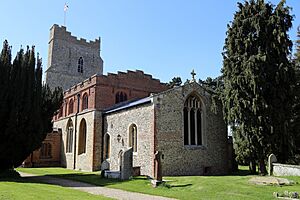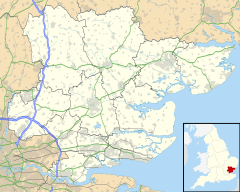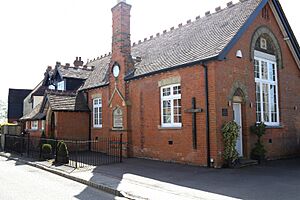High Easter facts for kids
Quick facts for kids High Easter |
|
|---|---|
 Parish church of St Mary |
|
| Population | 754 (2011) |
| OS grid reference | TL620146 |
| District |
|
| Shire county | |
| Region | |
| Country | England |
| Sovereign state | United Kingdom |
| Post town | Chelmsford |
| Postcode district | CM1 |
| Dialling code | 01245 |
| Police | Essex |
| Fire | Essex |
| Ambulance | East of England |
| EU Parliament | East of England |
High Easter is a small village and civil parish in Essex, England. It is part of the Uttlesford district. The village is about 7 kilometers (4.3 miles) northwest of the city of Chelmsford.
The parish includes two smaller areas called Bishop's Green and Stagden Cross. A stream called Parsonage Brook flows near the village. It joins the River Can, which starts about 4 kilometers (2.5 miles) from the village. High Easter is in an area known as 'The Easters', which is next to 'The Rodings'. In 2011, about 754 people lived in the parish.
Contents
History of High Easter
What's in a Name?
The name 'High Easter' might sound like the Christian holiday, but it's not. It comes from an old word, Estre, from the 11th century. This word meant a 'sheep fold' or 'a place where sheep are kept'. The 'High' part means the village is on higher ground. It also helps tell it apart from its nearby village, Good Easter.
Good Easter has a similar name origin. Its name comes from an Anglo-Saxon woman's name, Godgyth or Godgifu. She likely owned the land there a long time ago.
Early Days and Owners
Before the Norman Conquest in 1066, High Easter belonged to Ely Abbey. After the Conquest, it was given to a Norman lord named Geoffrey de Mandeville.
The main house of the area was 'High Easterbury'. This house is very old, dating back to the 13th century. It is now a Grade II* listed building, meaning it's historically important. Many famous families, like the Earls of Essex, used to own this house and the land around it.
Life in the 1800s
In 1895, High Easter was a farming area. The land was mostly clay and grew wheat, beans, and barley. About 690 people lived there in 1891. Queen Victoria was even one of the main landowners! Other important landowners included Lord Rayleigh.
The village church, St Mary's, was fixed up in 1865. The Bishop of London helped choose the church's priest. The priest in 1895 was Rev. Edward Francis Gepp. He was also a JP for Essex, meaning he helped with local law and order.
There were two schools in High Easter back then. One was a National School for over 200 children. Another was the Manning Prentice Memorial School, built in 1893. This school was next to the Congregational church.
People in High Easter had many different jobs in 1895. There was a tailor, a blacksmith, and people who made and fixed wheels. There were also grocers, a shoemaker, and a miller who used wind and steam power. Many people worked as farmers. The village also had public houses, run by 'licensed victuallers'.
An archaeologist named Miller Christy once wrote about the area. He said that many old farmhouses in 'The Easters' were made of timber and plaster. Many of them had moats (ditches filled with water) and large brick chimneys.
Geography
High Easter village is about 75 meters (246 feet) above sea level. It is just west of where the River Can begins. The river flows southeast from the village and meets the River Chelmer in Chelmsford.
High Easter is part of a group of villages in Essex called 'The Easters'. This area is located next to 'The Rodings' villages.
Community Life
High Easter village has several useful places for its community. There's a post office and a cafe. You can also find a parish church, a restaurant, and a village hall. For sports, there's a football pitch and a cricket pitch.
The parish of High Easter has about 70 listed buildings. These are old houses, farmhouses, cottages, and pubs that are important to history. The St Mary's Parish Church is a Grade I listed building. This means it is very important and dates back to the 12th century.
Location grid
 |
Bishop's Green, Great Dunmow |  |
||
| Leaden Roding | Stagden Cross, Pleshey | |||
| Good Easter |
See also
 In Spanish: High Easter para niños
In Spanish: High Easter para niños
 | DeHart Hubbard |
 | Wilma Rudolph |
 | Jesse Owens |
 | Jackie Joyner-Kersee |
 | Major Taylor |



